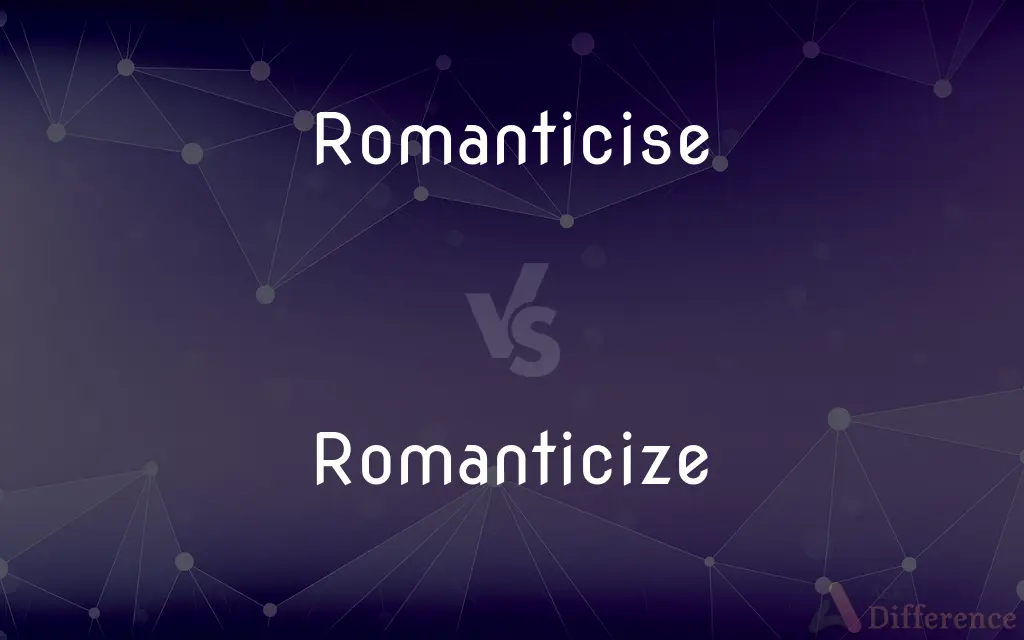Romanticise vs. Romanticize — What's the Difference?
Edited by Tayyaba Rehman — By Maham Liaqat — Updated on April 26, 2024
"Romanticise" and "romanticize" are the British and American spellings respectively of a verb meaning to make something appear better or more idealistic than it is.

Difference Between Romanticise and Romanticize
Table of Contents
ADVERTISEMENT
Key Differences
The term "romanticise" is the preferred spelling in British English, used when describing the act of viewing or presenting something in an unrealistically positive light. Whereas "romanticize" is used in American English, applying the same concept of adding a romantic allure or idealized view to an event, person, or scenario.
Both terms share the same etymology, derived from the notion of romanticism, a movement that emphasized emotion and individualism. On the other hand, they manifest the typical differences between British and American English spelling conventions, similar to "realise" vs. "realize."
In literature, "romanticise" might be used in British publications when authors infuse ordinary settings with a sense of beauty or mystery. On the other hand, "romanticize" appears in American texts where authors might portray historical events with added drama or emotional appeal.
In daily use, someone in the UK might accuse a speaker of romanticising the past, implying a biased, beautified view. Whereas in the US, the same accusation would use "romanticize," referring to the same tendency to idealize past events.
Despite their spelling differences, both forms convey the same meanings and are used interchangeably in terms of context and syntax within their respective dialects.
ADVERTISEMENT
Comparison Chart
Spelling Region
British English
American English
Example Usage
"He tends to romanticise his childhood."
"She tends to romanticize her first love."
Literary Movement Origin
Romanticism
Romanticism
Common Misinterpretation
Overly idealizing, especially in past tense
Overly idealizing, especially in past tense
Syntax and Context
Used identically to "romanticize"
Used identically to "romanticise"
Compare with Definitions
Romanticise
To make something seem better or more appealing than it really is.
He tends to romanticise the hardships he faced.
Romanticize
To think of or depict something in an idealized or unrealistic manner.
He romanticizes the golden age of Hollywood.
Romanticise
To make something appear more mysterious or appealing to the emotions.
Poets can romanticise even the most mundane moments.
Romanticize
To cause to be perceived as attractive or interesting through idealization.
Artists often romanticize rural life.
Romanticise
To attribute romantic qualities to.
She romanticised their encounter much more than was necessary.
Romanticize
To imbue with an aura of romance.
The singer's lyrics romanticize young love.
Romanticise
To describe or think about something in a way that highlights its positive qualities while ignoring the negative ones.
Authors often romanticise the medieval period.
Romanticize
To make something appear more appealing or special than it actually is.
The novel tends to romanticize the protagonist's adventures.
Romanticise
To deal with or describe in an idealistic or unrealistic fashion.
The film romanticises the life of pirates.
Romanticize
To present something in a way that emphasizes its positive aspects and downplays the negative.
The tour guide romanticized the city's colonial history.
Romanticise
Standard spelling of romanticize
Romanticize
To view or interpret romantically; make romantic.
Romanticise
Interpret romantically;
Don't romanticize this uninteresting and hard work!
Romanticize
To think in a romantic way.
Romanticise
Make romantic in style;
The designer romanticized the little black dress
Romanticize
(transitive) To interpret, view, or portray something in a romantic (unrealistic, idealized) manner.
Romanticize
(intransitive) To think or act in a romantic manner.
Romanticize
Interpret romantically;
Don't romanticize this uninteresting and hard work!
Romanticize
Make romantic in style;
The designer romanticized the little black dress
Romanticize
Act in a romantic way
Common Curiosities
What effect does romanticizing have on historical events?
It can lead to a distorted understanding of history, emphasizing the positive and minimizing the negative.
Can "romanticise" and "romanticize" be used interchangeably?
Yes, they can be used interchangeably within the context of their respective varieties of English.
Are there any negative implications of romanticizing?
Yes, romanticizing can lead to unrealistic expectations and misunderstandings about reality.
Is there a psychological impact of romanticizing the past?
Yes, it can affect one's perception of the present and expectations for the future, often leading to disappointment.
Does romanticizing affect mental health?
It can, particularly if it leads to chronic dissatisfaction with reality.
How do "romanticise" and "romanticize" relate to the arts?
Both are often used in discussing literature, film, and art that present subjects in an idealized light.
Are "romanticise" and "romanticize" found in academic writing?
Yes, they are used in academic contexts to discuss the portrayal and perception of various topics.
What is the main difference between "romanticise" and "romanticize"?
The main difference is the spelling: "romanticise" is British, and "romanticize" is American.
Does "romanticise" only apply to romantic relationships?
No, it can apply to any aspect of life that is portrayed in an overly idealistic way.
How can one avoid romanticizing in personal storytelling?
By striving to provide a balanced view that acknowledges both positives and negatives.
Share Your Discovery

Previous Comparison
Save vs. Store
Next Comparison
Lawsuit vs. CaseAuthor Spotlight
Written by
Maham LiaqatEdited by
Tayyaba RehmanTayyaba Rehman is a distinguished writer, currently serving as a primary contributor to askdifference.com. As a researcher in semantics and etymology, Tayyaba's passion for the complexity of languages and their distinctions has found a perfect home on the platform. Tayyaba delves into the intricacies of language, distinguishing between commonly confused words and phrases, thereby providing clarity for readers worldwide.
















































